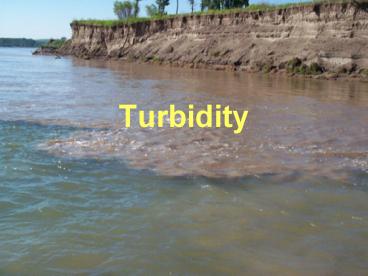Turbidity - PowerPoint PPT Presentation
1 / 18
Title:
Turbidity
Description:
Turbidity What is Turbidity? A measure of water clarity The murkier the water, the higher the turbidity. Turbidity reduces the transmission of light into water. – PowerPoint PPT presentation
Number of Views:145
Avg rating:3.0/5.0
Title: Turbidity
1
Turbidity
2
What is Turbidity?
- A measure of water clarity
- The murkier the water, the higher the turbidity.
- Turbidity reduces the transmission of light into
water. - Turbidity increases as a result of suspended
solids in the water.
3
Sources of Turbidity
- Phytoplankton blooms
- Soil erosion
- Waste discharge
- Urban runoff
- Abundant bottom feeders
4
Why is Turbidity Important?
- Suspended particles diffuse sunlight and absorb
heat. - As temperature increases, DO decreases.
- Suspended solids can clog fish gills
- Less light is available for photosynthesis.
- As sediment settles, gravel beds become fouled.
5
How is Turbidity Measured?
- Secchi disk
- Measures water transparency
- Measures depth at which disk is no longer visible
- Useful for deep water
6
Turbidity in the lab and field
- Turbidimeter
- optical device that measures scattering of light
(most accurate) - Measure in NTU (nephelometric turbidity units) or
JTU (Jackson turbidity units)
7
What is the Turbidity of our Water?
- 5 NTUs maximum contamination level allowed
(MCL) - 0.45 NTU highest average turbidity from a local
well - 0.15 NTU highest level found at Del Valle Water
Treatment Plant
8
Typical Turbidity Data
Water Source Turbidity Level
Water bodies with sparse plant and animal life 0 JTU
Drinking water lt0.5 JTU
Typical groundwater lt1.0 JTU
Water bodies with moderate plant and animal life 1 - 8 JTU
Water bodies with large plumes of planktonic life 10 - 30 JTU
Muddy water or winter storm flows in rivers 20 - 50 JTU
Water Quality Testing and Monitoring Program for
Middle Schools and High Schools. San Diego
County Water Authority.
9
So what?
- Increase in turbidity in reservoirs in
southwestern U.S. - Increase in turbidity in Delta waters during dry
years - Degrades drinking water quality.
- Water treatment costs increase.
- Decreases light penetration in water.
- Can clog gills of fish.
10
Conductivity
11
What is Conductivity?
- Conductivity is the measure of waters ability to
conduct an electric current. - Estimates amount of total dissolved minerals
(ions).
12
Conductivity in water
- Dissolved salts (ions) conduct electrical current
in water. - Absolutely pure water is a poor electrical
conductor.
http//www.humboldt.edu/dp6/chem110/cond/cond.htm
l
13
How do we measure Conductivity?
- Test with a Conductivity meter
- Measured in Siemens or mhos/cm
14
Conductivity Units
- Mhos is ohms backwards! (Mhos is the reciprocal
of ohms if you have to know) - So.ohms is a measure of the resistance to a
current. - The less the resistance, the greater the
conductivity. - Conductivity in drinking water is low, so we use
µmhos/cm or 1 x 10-6 mhos/cm! - Units are sometimes expressed as microsiemens
(µS).
15
Conductivity and Turbidity Demo
- SEE HANDOUT
- Use of lightbulb as class demo
- Use of conductivity meter
- Use of probeware
- Kit Secchi disk
16
Some Conductivity Data
Water Type Conductivity (µmhos/cm)
Distilled Water 0.5 - 3.0
Melted snow 2 - 42
Potable water in U.S. 30 - 1500
Irrigation Supply Water lt 750
Water Source Salinity (g/L)
Sea water 33 - 37
Salton Sea 44
Mono Lake 90
http//www.swrcb.ca.gov/nps/docs/Cond_sal.doc
17
So What?
- Increased concentration of salts increases the
conductivity - Salts cannot be filtered out
- Higher conductivity can.
- Foul irrigation water (leads to high salinity
soils) - Kill wildlife
- Create water shortages
18
Salt water and cells
- Salt water is hypertonic to the cells of some
plants - This causes plants to wilt and possibly die
http//www.cofc.edu/zaninm/packet_two_files/image
024.jpg
http//www.encyclopedia.com/html/section/osmosis_B
iologicalImportanceofOsmosis.asp































